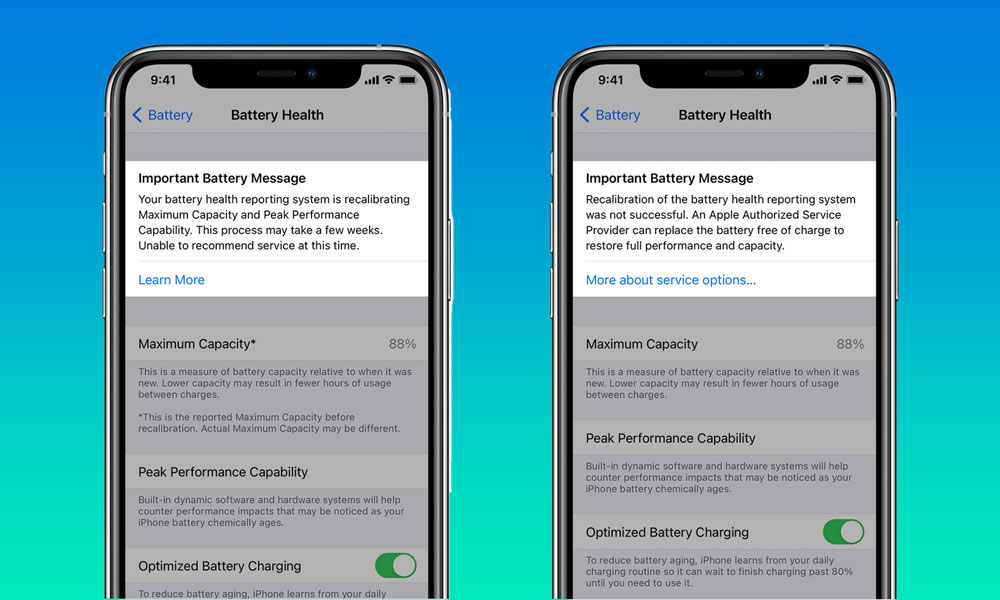iOS 14.5 Will Recalibrate Your iPhone 11 Battery for Peak Performance
 Credit: Apple
Credit: AppleToggle Dark Mode
If you’ve been having problems with battery life on your iPhone 11, you’ll be happy to know that a fix is on the way.
A new feature in the sixth beta of iOS 14.5 that was released yesterday now offers a process for recalibrating the battery health reporting on the iPhone 11, iPhone 11 Pro, and iPhone 11 Pro Max.
While the recalibration option seems to be limited to only those specific models for now, that’s likely because of a known issue with the iPhone 11 lineup. Many iPhone 11 users have been reporting problems with unexpectedly rapid battery drain and performance capability, and it turns out that these problems may be caused simply by improper battery calibration.
Power management on modern electronic devices like the iPhone can be quite complicated; there’s a lot more to it than just running your iPhone until the battery goes dead.
For example, draining a lithium-ion battery completely will actually render it unusable, so any electronic device that uses this technology (which is pretty much all of them), have to incorporate a cut-off circuit to shut down and stop consuming power when the charge falls below a certain threshold. Similarly, overcharging a lithium-ion battery is downright dangerous as it can lead to explosions and fires. Hence, the power management system also has to make sure that there’s a safe zone at the top of the charge range, and stop charging the battery when it reaches that level.
Then there’s also the problem that, due to how the chemistry in lithium-ion batteries works, you can actually shorten the life of your battery dramatically by causing it to overheat or applying too much charging current at the top end of the range.
This is why even Apple’s fastest 20W wired USB-C chargers can get your iPhone 12 up to a 50 percent charge in about a half-hour while then taking another hour just to go from there to 80 percent. It’s also why Apple introduced optimized battery charging in iOS 13 to help prolong battery health by reducing the amount of time the iPhone sits at a full charge level. It’s a great feature that also came to the Mac last year.
Battery Calibration
To make all this work, however, it’s necessary for iOS to have a good idea of where your battery is actually at, and it’s not as simple as just reading the voltage levels. As Apple explains in a new support document:
Maximum battery capacity is determined using a set of algorithms and measurements taken during use. Over time, these algorithms might be updated to provide the best estimate of maximum battery capacity.
As we’ve repeatedly seen with various iPhone models over the years, it’s quite possible for iOS to have an idea of your iPhone’s battery capacity that’s not reflective of reality. In other words, it might think that your battery is drained — or draining faster — even when it actually has a 50 percent of battery charge remaining.
These problems occur as a result of improper battery calibration, and in fact it’s one of the reasons that, back in the days of the iPod, Apple used to recommend draining and recharging your device at least once a month. This wasn’t to “condition” the battery, and in fact it had nothing to do with the chemistry of the battery at all; rather, it was to calibrate the battery meter so that the iPod would have an accurate read on the actual capacity.
Recalibration in iOS 14.5
With the impending release of iOS 14.5, it looks like Apple will be offering a recalibration procedure to allow iPhone 11 owners to make sure that everything matches up between iOS and their actual battery cells.
Apple makes it clear in its support document that the problems with battery health reporting don’t reflect an actual issue with battery health. Of course, for many users the results have been the same either way; after all, if your battery is draining much faster than it used to, it’s reasonable to assume it’s the battery that’s the problem, and not some arcane iOS calibration feature.
The good news for iPhone 11 users who have been having battery problems is that it looks like iOS 14.5 will actually handle all of this almost automatically.
As Apple notes, after you update to iOS 14.5, you’ll see a message in the iOS 14.5 Battery Health section of your iPhone Settings app if your iPhone requires battery recalibration.
As this message notes, the recalibration process may actually take a few weeks, since your iPhone will have to measure daily use and regular charge cycles. You can continue using your iPhone 11 normally while the recalibration is ongoing, and the message will remain in place until the process has successfully completed, after which it will simply disappear.
If the process fails to complete properly, then you’ll be advised to have the battery replaced free of charge at an Apple Authorized Service Provider. Apple emphasizes that this doesn’t represent a safety issue, so you won’t need to rush right out for a replacement, but until you do get the battery replaced, you may experience battery and performance issues.






